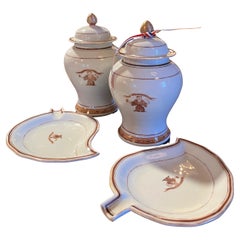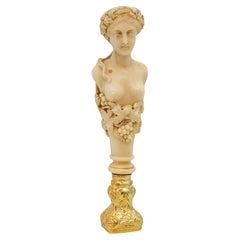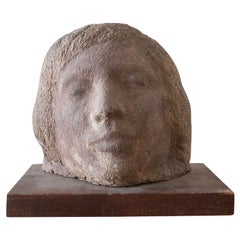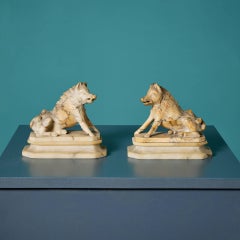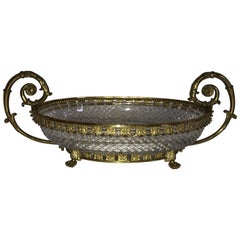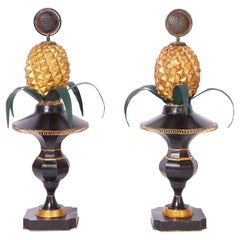Neoclassical Decorative Objects
Neoclassical design emerged in Europe in the 1750s, as the Age of Enlightenment reached full flower. Neoclassical furniture took its cues from the styles of ancient Rome and Athens: symmetrical, ordered, dignified forms with such details as tapered and fluted chair and table legs, backrest finials and scrolled arms.
Over a period of some 20 years, first in France and later in Britain, neoclassical design — also known as Louis XVI, or Louis Seize — would supersede the lithe and curvaceous Rococo or Louis XV style.
The first half of the 18th century had seen a rebirth of interest in classical antiquity. The "Grand Tour" of Europe, codified as a part of the proper education of a patrician gentleman, included an extended visit to Rome. Some ventured further, to sketch the ruins of ancient Greece. These drawings and others — particularly those derived from the surprising and rich archaeological discoveries in the 1730s and ’40s at the sites of the Roman cities of Pompeii and Herculaneum — caused great excitement among intellectuals and aesthetes alike.
Neoclassical furniture is meant to reflect both grace and power. The overall appearance of neoclassical chairs, tables and cabinetry is strong and rectilinear. These pieces are, in effect, classical architecture in miniature: chair and table legs are shaped like columns; cabinets are constructed with elements that mirror friezes and pediments.
Yet neoclassicism is enlivened by gilt and silver leaf, marquetry, and carved and applied ornamental motifs based on Greek and Roman sculpture: acanthus leaves, garlands, laurel wreaths, sheaves of arrow, medallions and chair splats are carved in the shapes of lyres and urns. Ormolu — or elaborate bronze gilding — was essential to French design in the 18th and 19th centuries as a cornerstone of the neoclassical and Empire styles.
As you can see from the furniture on these pages, there is a bit of whimsy in such stately pieces — a touch of lightness that will always keep neoclassicism fresh.
Find antique neoclassical furniture today on 1stDibs.
19th Century French Antique Neoclassical Decorative Objects
Porcelain
1790s French Antique Neoclassical Decorative Objects
Gold, Silver
1930s American Vintage Neoclassical Decorative Objects
Early 19th Century Italian Antique Neoclassical Decorative Objects
Alabaster, Marble
1920s French Vintage Neoclassical Decorative Objects
Crystal, Ormolu, Bronze
20th Century Italian Neoclassical Decorative Objects
Metal
Early 20th Century Neoclassical Decorative Objects
Bronze
20th Century French Neoclassical Decorative Objects
Plaster
20th Century French Neoclassical Decorative Objects
Plaster
20th Century French Neoclassical Decorative Objects
Terracotta
20th Century French Neoclassical Decorative Objects
Plaster
20th Century French Neoclassical Decorative Objects
Terracotta
19th Century French Antique Neoclassical Decorative Objects
Bronze, Ormolu
18th Century Unknown Antique Neoclassical Decorative Objects
Bronze
1790s English Antique Neoclassical Decorative Objects
Sterling Silver
1760s Italian Antique Neoclassical Decorative Objects
Brass
Late 20th Century American Neoclassical Decorative Objects
Brass
18th Century German Antique Neoclassical Decorative Objects
Porcelain
19th Century Antique Neoclassical Decorative Objects
Bronze
20th Century American Neoclassical Decorative Objects
Bronze
Mid-19th Century English Antique Neoclassical Decorative Objects
Stoneware
Early 19th Century Russian Antique Neoclassical Decorative Objects
Bronze
Late 18th Century Italian Antique Neoclassical Decorative Objects
Marble, Belgian Black Marble, Bronze
20th Century French Neoclassical Decorative Objects
Terracotta
20th Century French Neoclassical Decorative Objects
Terracotta
1920s English Vintage Neoclassical Decorative Objects
Silver, Sterling Silver
19th Century Antique Neoclassical Decorative Objects
Paint
20th Century French Neoclassical Decorative Objects
Plaster
19th Century Italian Antique Neoclassical Decorative Objects
Marble
Early 19th Century French Antique Neoclassical Decorative Objects
Marble, Brass, Bronze
Early 20th Century Neoclassical Decorative Objects
Cane, Walnut
Late 18th Century French Antique Neoclassical Decorative Objects
Marble, Bronze, Enamel
1820s Antique Neoclassical Decorative Objects
Other
Early 19th Century Antique Neoclassical Decorative Objects
Wood
19th Century English Antique Neoclassical Decorative Objects
Rock Crystal, Ormolu
18th Century European Antique Neoclassical Decorative Objects
Other
20th Century Neoclassical Decorative Objects
Bronze
18th Century English Antique Neoclassical Decorative Objects
Silver
Early 20th Century German Neoclassical Decorative Objects
Porcelain
19th Century French Antique Neoclassical Decorative Objects
Crystal, Bronze
1970s Swedish Vintage Neoclassical Decorative Objects
Silver, Sterling Silver
1890s Austrian Antique Neoclassical Decorative Objects
Brass
19th Century Italian Antique Neoclassical Decorative Objects
Bronze, Metal
Early 2000s Italian Neoclassical Decorative Objects
Ceramic, Majolica
1870s Danish Antique Neoclassical Decorative Objects
Ceramic
1790s French Antique Neoclassical Decorative Objects
Gold
20th Century Unknown Neoclassical Decorative Objects
Metal
Early 20th Century Neoclassical Decorative Objects
Iron
1980s Italian Vintage Neoclassical Decorative Objects
Ceramic
Early 20th Century Italian Neoclassical Decorative Objects
Terracotta
2010s European Neoclassical Decorative Objects
Alabaster
20th Century Neoclassical Decorative Objects
Mid-18th Century English Antique Neoclassical Decorative Objects
Gold
Early 20th Century Unknown Neoclassical Decorative Objects
Porcelain
Early 19th Century English Antique Neoclassical Decorative Objects
Plaster
Mid-19th Century American Antique Neoclassical Decorative Objects
Silver
21st Century and Contemporary North American Neoclassical Decorative Objects
Acrylic
1940s French Vintage Neoclassical Decorative Objects
Bronze
Early 19th Century European Antique Neoclassical Decorative Objects
Silver
